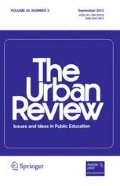Abstract
This mixed-methods qualitative study examined the relationship between perceptions of the importance of social media (i.e., Facebook, Twitter) with community service projects and volunteerism. Participants (n = 80) were interviewed and surveyed regarding their experiences in participating in a variety of community service work (CSW) projects (i.e., urban forestry, community gardening) with their perceptions of the importance of social media. Results supported the hypothesis that a significant correlation exists (r = .286, p < .05) between perceptions of technology as an important part of my life and reduced importance of CSW activities. A significant correlation (r = 287, p < .001) also developed between perceptions of “connectedness” to one’s community, increased technology use and reduced perceptions of the importance of CSW activities. Additionally, a significant positive correlation (r = .454, p < .001) was found between reports of improved perceptions among ethnically diverse populations and the overall importance of CSW activities within the community. Results and suggestions for further research are offered regarding the application of theory to “real world” perspectives and problems involving education and environmental issues.
Similar content being viewed by others
References
Allen, N. B., & Badcock, P. B. (2003). The social risk hypothesis of depressed mood: Evolutionary, psychosocial, and neurobiological perspectives. Psychological Bulletin, 129, 887–913.
Bastos, M. T. (2014). Shares, pins and tweets: News readership from daily papers to social media. Journalism Studies. doi:10.1080/1461670X.2014.891857.
Batt-Rawden, S., Flickenger, T., Weiner, J., Cheston, C., & Chisolm, M. (2014). The role of social media in clinical excellence. Clinical Teacher, 11(4), 264–269.
Blease, C. R. (2015). Too many ‘friends’, too few ‘likes’? Evolutionary psychology and Facebook depression. Review of General Psychology, 19(1), 1–13.
Bryan, J., & Henry, L. (2011). A model for building school-family-community partnerships: Principles and process. Journal of Counseling and Development, 90, 408–420.
Campbell, S., Chong, S., Ewen, V., Toombs, E., Tazlazidis, R., & Maranzan, K. A. (2016). Social media policy for graduate students: Challenges and opportunities for professional psychology training programs. Canadian Psychology, 57(3), 202–210.
Caruso, J. B. & Salaway, G. (2007). The ECAR study of undergraduate students and information technology. http://www.csplacement.com/downloads/ECAR-ITSkliisstudy.pdf.
Featured Insights, Global, Media+Entertainment. Nielsen. Retrieved December 9, 2012 State of the media: The social media report 2012 (http://blog.nielsen.com/nielsenwire/social/2012).
Hoffman, A. J., Wallach, J. N., & Sanchez, E. (2010). Rediscovering community: Interethnic relationships and community gardening. Gateways: International Journal of Community Research and Engagement, 3, 171–184.
http://abcnews.go.com/print?id=321895. Keyboard Confessional: Clicking Your Way to Forgiveness.
http://children.webmd.com/news/20040702/video-games-tv-double-childhood-obesity-risk.
Jackson, M. (2005). From work-family balance to work-family interaction: Changing the metaphor. In D. Halpern & S. Elaine (Eds.), The limits of connectivity: Technology and twenty first-century life (pp. 135–150). Mahwah, NJ: Lawrence Erlbaum Associates.
Jacobs, M. K., Christenson, A., Snibbe, J. R., Dolezal-Wood, S., Huber, A., & Jacobs, M. K. (2001). A comparison of computer-based versus traditional individual psychotherapy. Professional Psychology: Research and Practice, 32, 92–96.
Jalali, A., Sherbino, J., Frank, J., & Sutherland, S. (2015). Social media and medical education: Exploring the potential of Twitter as a learning tool. International Review of Psychiatry, 27(2), 140–146.
Jalali, A., & Wood, T. J. (2013). Tweeting during conferences: Education or just another distraction? Medical Education, 47, 1119–1146.
Kaplan, A. M., & Haenlein, M. (2010). Users of the world, unite! The challenges and opportunities of social media. Business Horizons, 53, 61.
Kelly, J. (1971). Qualities for the community psychologist. American Psychologist, 25, 524–531.
Mihailidis, P. (2014). The civic-social media disconnect: Exploring perceptions of social media for engagement in the daily life of college students. Information Communication and Society, 17(9), 1059–1071.
Myers, S. B., Endres, M. A., Ruddy, M. E., & Zelikovsky, N. (2012). Psychology graduate training in the era of online social networking. Training and Education in Professional Psychology, 6, 28–38l.
Nitzan, U., Shoshan, E., Lev-Ran, S., & Fennig, S. (2013). Internet—Related psychosis—A sign of the times? The Israel Journal of Psychiatry and Related Sciences, 48, 207–211.
O’Keeffe, G. S., & Clarke-Pearson, K. (2011). The impact of social media on children, adolescents, and families. Pediatrics, 127, 800–804.
Pham, A. (2014). Navigating social networking and social media in school psychology: Ethical and professional considerations in training programs. Psychology in the Schools, 51, 767–778.
Putnam, R. (2000). Bowling alone: The collapse and revival of American community. New York: Simon & Shuster.
Rogers, E. M. (1987). Progress, problems and prospects for network research: Investigating relationships in the age of electronic communication technologies. Social Networks, 9, 285–310.
Sarason, S. B. (1974). The psychological sense of community: Perspectives for community psychology. San Francisco: Jossey-Bass.
Strauss, W., & Howe, N. (2000). Millennials rising: The next great generation. New York, NY: Random House Vintage Books.
Tidball, K. G., Krasny, M. E., Svendsen, E., Campbell, L., & Helphand, K. (2010). Stewardship, learning, and memory in disaster resilience. Environmental Education Research, 16, 591–609.
Tu, C., Dilley, A. E., & Kaufman, J. C. (2015). Do we create what we watch? Creativity and entertainment preferences. Psychology of Aesthetics Creativity and the Arts, 9, 394–404.
Twenge, J. M., Campbell, W. K., & Freeman, E. C. (2012). Generational differences in young adult’s life goals, concern for others, and civic orientation, 1966–2009. Journal of Personality and Social Psychology, 102, 1045–1062.
Vogel, E. A., Rose, J. P., Roberts, L. R., & Eckles, K. (2014). Social comparison, social media, and self-esteem. Psychology of Popular Media, 3(4), 206–222.
Wakefield, J. (2014). Facebook turns 10 but are its days numbered? BBC News. Retrieved 10 February 10, 2014 from http://www.bbc.co.uk/news/technology-25953225.
Wolff, T. (2010). The power of collaborative solutions: Six principles and effective tools for building healthy communities. San Fransisco, CA: Jossey-Bass.
Wolff, T. (2013). A community psychologist’s involvement in policy change at the community level: Three stories from a practitioner. Global Journal of Community Psychology Practice, 4(2), 2–12.
Author information
Authors and Affiliations
Corresponding author
Appendix: Social Media—Community Service Questionnaire
Appendix: Social Media—Community Service Questionnaire


Rights and permissions
About this article
Cite this article
Hoffman, A.J. Millennials, Technology and Perceived Relevance of Community Service Organizations: Is Social Media Replacing Community Service Activities?. Urban Rev 49, 140–152 (2017). https://doi.org/10.1007/s11256-016-0385-6
Published:
Issue Date:
DOI: https://doi.org/10.1007/s11256-016-0385-6




